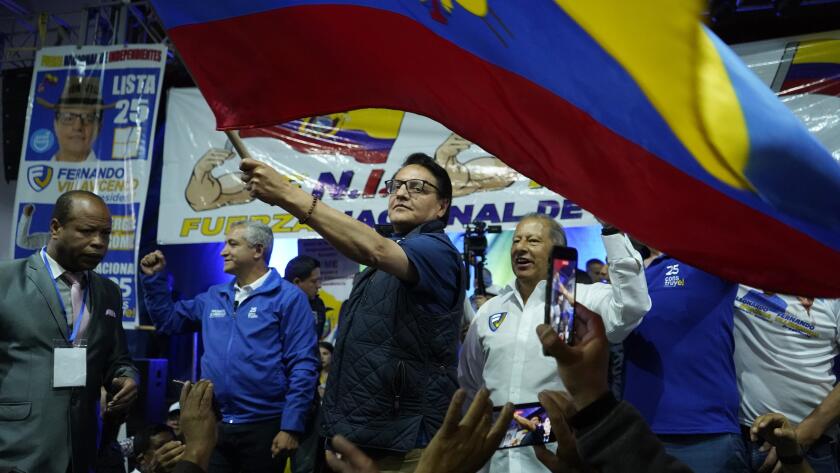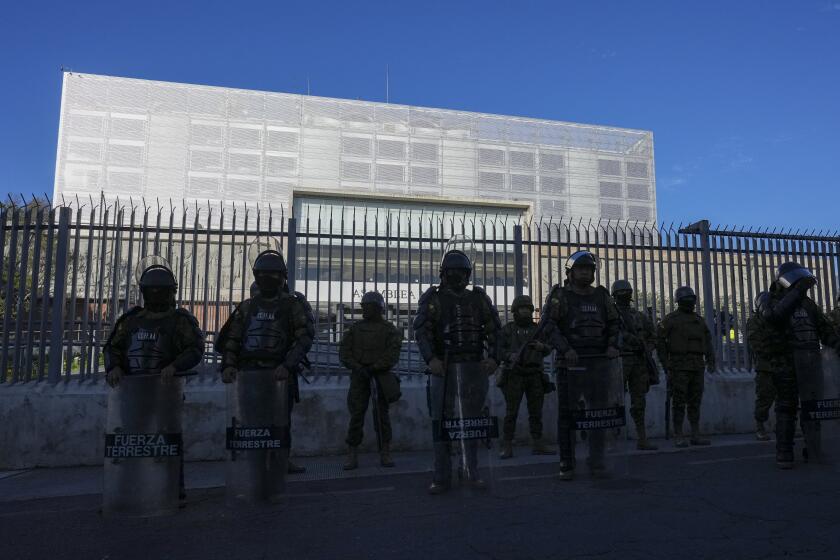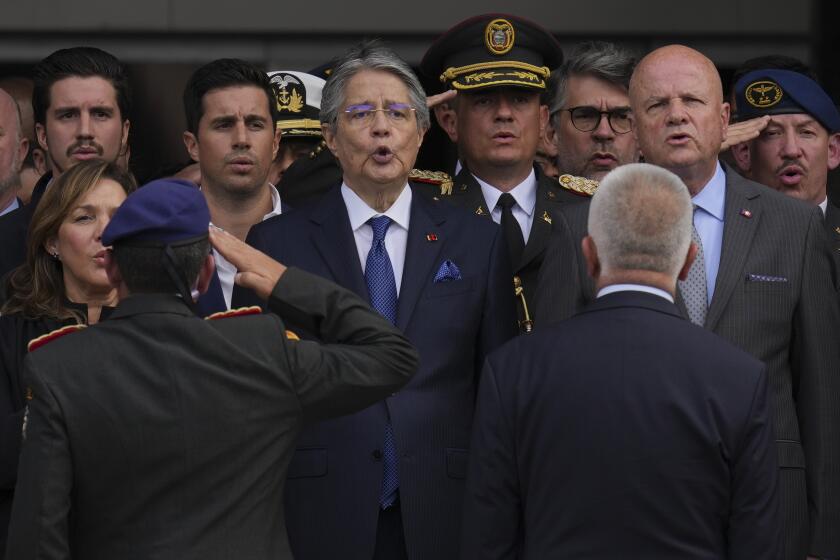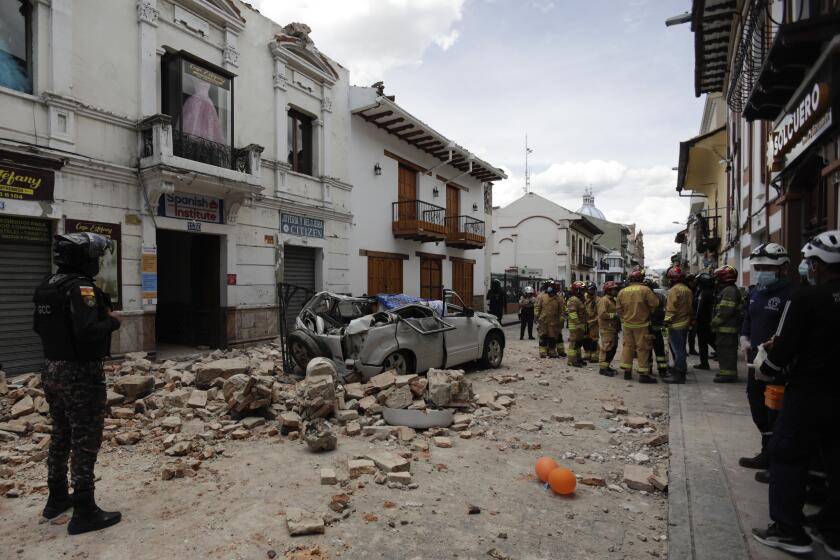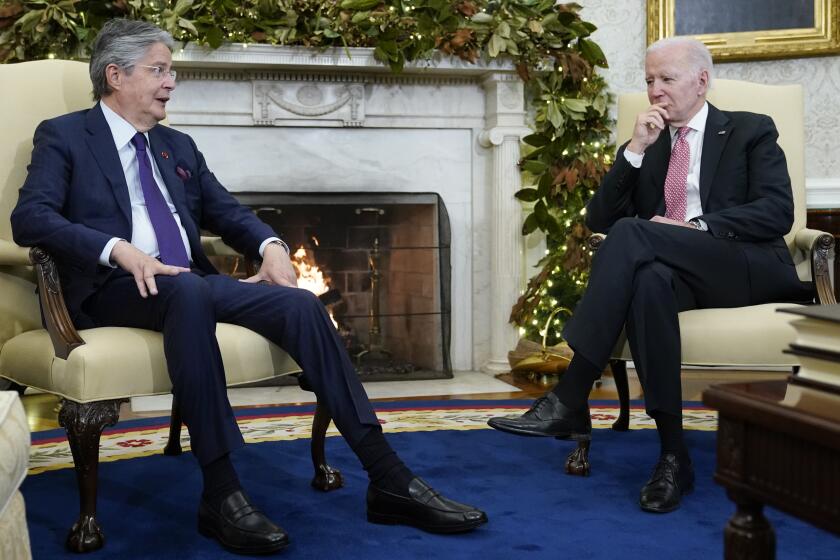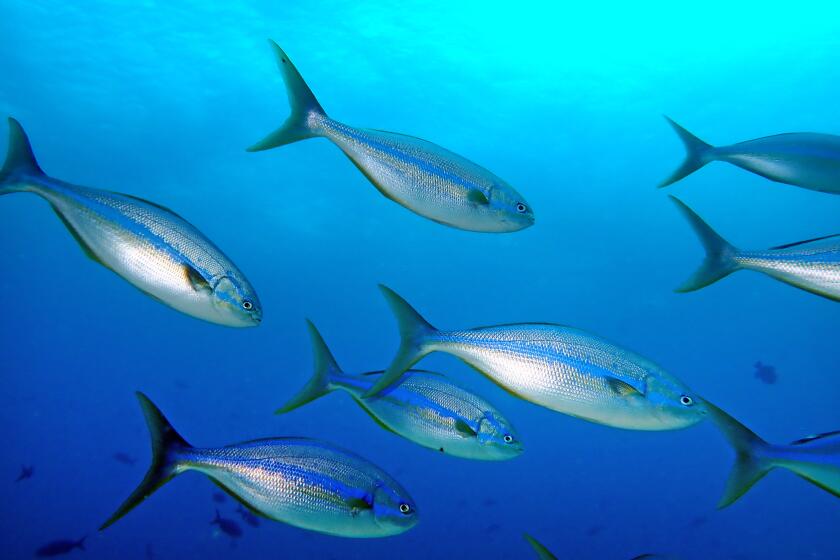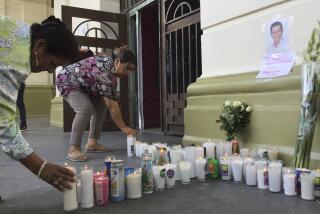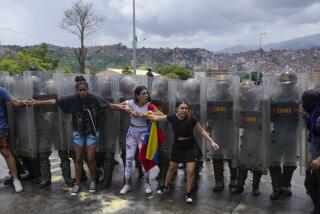Ecuador arrests six Colombians in slaying of anti-corruption presidential candidate
- Share via
Fernando Villavicencio was killed by a gunman at a political rally in Quito, the capital of Ecuador, where drug trafficking and violence have surged.
- Share via
QUITO, Ecuador — The six men arrested as suspects in the assassination of an anti-corruption Ecuadorean presidential candidate are Colombian nationals, a police report said Thursday as authorities investigated the motive for a crime that shocked a nation already reeling from a surge in drug-related violence.
The six men were captured hiding in a house in Quito, Ecuador’s capital, said the report, which was reviewed by the Associated Press. Officers also seized four shotguns, a 5.56-millimeter rifle, ammunition and three grenades, along with a vehicle and a motorcycle, it said.
Fernando Villavicencio, 59, who was known for speaking up against drug cartels, was assassinated in Quito on Wednesday, less than two weeks before a special presidential election. He was not a front-runner, but his death deepened the sense of crisis around organized crime that has already claimed thousands of lives and underscored the challenge that Ecuador’s next leader will face.
Ecuador’s interior minister, Juan Zapata, had earlier confirmed the arrest of some foreigners in the case, although he didn’t give their nationalities.
Zapata described the killing as a “political crime of a terrorist nature” aimed at sabotaging the Aug. 20 presidential election.
Fernando Villavicencio was killed by a gunman at a political rally in Quito, the capital of Ecuador, where drug trafficking and violence have surged.
The police report doesn’t say whether the Colombians are alleged to be members of a criminal group. Zapata said those arrested were linked to organized crime, although he didn’t give more details.
Villavicencio had said he was threatened by affiliates of Mexico’s Sinaloa cartel, one of a slew of international organized crime groups that now operate in Ecuador. He said his campaign represented a threat to such groups.
The involvement of Colombian nationals brings to the mind the 2021 assassination of Haitian President Jovenel Moïse, who was shot a dozen times at his private home. Among the people arrested in the case are 18 former soldiers from Colombia.
Video of the rally in Quito posted on social media appeared to show Villavicencio walking out of the rally surrounded by guards. The footage then showed the candidate getting into a white pickup truck before gunshots were heard, followed by screams and commotion around the truck.
The sequence of events was confirmed to AP by Patricio Zuquilanda, Villavicencio’s campaign advisor.
The candidate had received at least three death threats before the shooting and reported them to authorities, resulting in one detention, the advisor said.
“The Ecuadorean people are crying and Ecuador is mortally wounded,” he said. “Politics cannot lead to the death of any member of society.”
The president disbanded the National Assembly to avoid impeachment. The move bodes ill for the country’s democracy and could return Rafael Correa to power.
Former Vice President Otto Sonnenholzner, who also is seeking the presidency, bemoaned the loss at a news conference: “We are dying, drowning in a sea of tears, and we do not deserve to live like this. We demand that you do something.”
The assassins threw a grenade into the street to cover their flight, but it did not explode, President Guillermo Lasso said. Police later destroyed it in a controlled explosion.
One suspect died in custody from wounds sustained in a firefight, the attorney general’s office said. The authorities had reported on Wednesday that six people had been detained, but they didn’t give any details until Thursday.
Lasso suggested the slaying could be linked to organized crime and insisted on proceeding with the election scheduled for Aug. 20. He declared three days of national mourning and a state of emergency that involves deploying additional military personnel throughout the country.
“Given the loss of a democrat and a fighter, the elections are not suspended. On the contrary, they have to be held, and democracy has to be strengthened,” Lasso said Thursday.
Ecuadorean President Guillermo Lasso has put an end to impeachment proceedings against him by dissolving the opposition-led National Assembly.
In his final speech before he was killed, Villavicencio promised a roaring crowd that he would fight corruption and imprison more criminals.
Villavicencio, one of eight candidates running for president, was the candidate of the Build Ecuador Movement.
In his final speech before he was shot, Villavicencio, 59, promised a roaring crowd that he would root out corruption and lock up the country’s “thieves.”
Villavicencio, one of eight candidates running for president, was the nominee of the Build Ecuador Movement. He had said his campaign represented a threat to international crime groups.
“Here I am showing my face. I’m not scared of them,” Villavicencio said in a statement before his death, naming detained crime boss José Adolfo Macías by his alias, Fito.
As drug traffickers have begun to use the country’s coastal ports, Ecuadoreans have reeled from violence not seen for decades. The sound of gunfire rings in many major cities as rival gangs battle for control, and gangs have recruited children.
The death toll from an earthquake that rocked Ecuador and Peru over the weekend stands at 15, with many residents fearful of a major aftershock.
Just last month, the mayor of the port city of Manta was shot and killed. On July 26, Lasso declared a state of emergency covering two provinces and the country’s prison system in an effort to stem the violence.
People waiting for buses Thursday morning in Guayaquil, a port city south of Quito that has been the epicenter of gang violence, expressed shock over the killing of Villavicencio.
Biden administration efforts to find a partner in Latin America ignore Ecuador’s severe problems, congressional critics say.
“It shows that the violence in the country is increasing,” pharmacist Leidy Aguirre, 28, said. “Politicians supposedly have more security than citizens, and this shows that not even they are safe.”
Villavicencio was one of the most critical voices against corruption, especially during the government of former President Rafael Correa, who led from 2007 to 2017.
Ecuador will expand protection around the Galapagos Island, safeguarding a critical migration route for sharks, fish and other marine life.
He was also an independent journalist who investigated corruption in previous governments, later entering politics as an anti-graft campaigner.
Villavicencio filed numerous judicial complaints against high-ranking members of the Correa government, including against the former president himself. He was sentenced to 18 months in prison for defamation over his criticisms of Correa, and fled to Indigenous territory in Ecuador, later receiving asylum in neighboring Peru.
Lasso, a conservative former banker, was elected in 2021 on a business-friendly platform and clashed from the start with the left-leaning majority coalition in the National Assembly.
A snap election was called after Lasso dissolved the National Assembly by decree in May, in a move to avoid being impeached over allegations that he failed to intervene to end a flawed contract between the state-owned oil transport company and a private tanker company.
More to Read
Sign up for Essential California
The most important California stories and recommendations in your inbox every morning.
You may occasionally receive promotional content from the Los Angeles Times.
